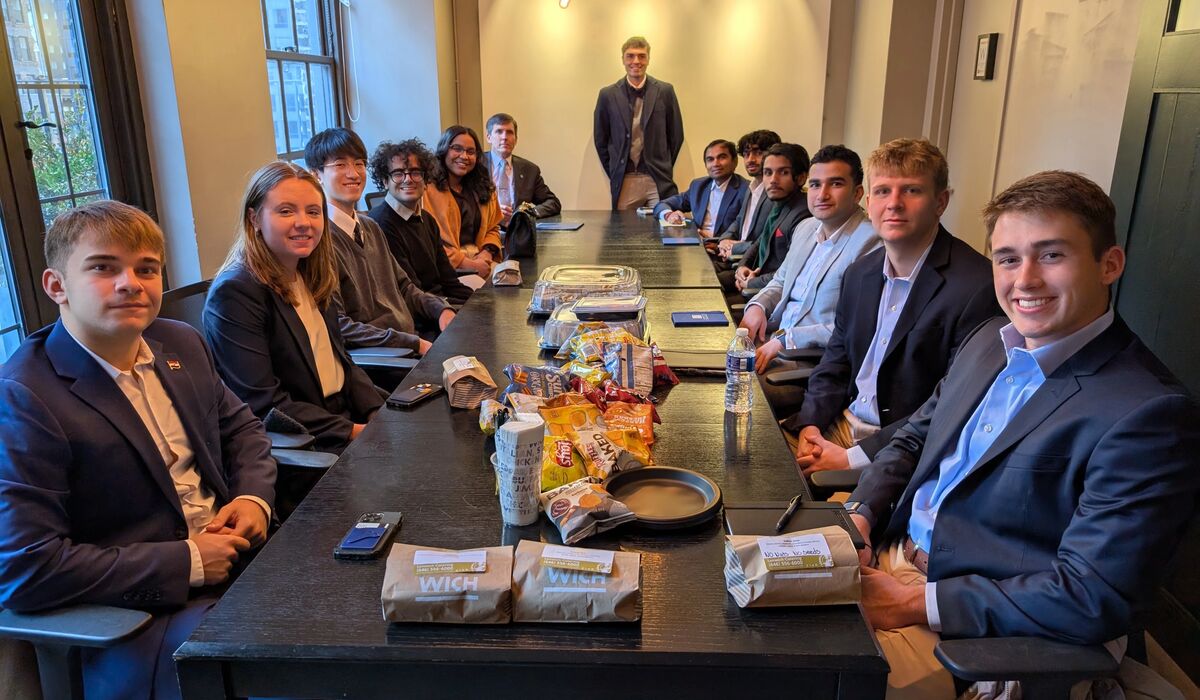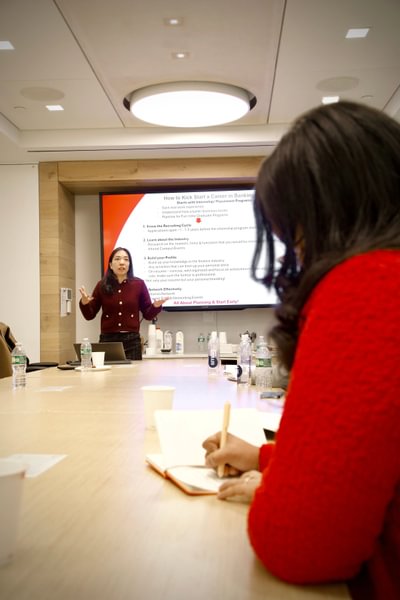
Gettysburg College students witness their dream careers in action through trips made possible by the Center for Career Engagement, which helps them prepare for postgraduate careers and build lifelong professional aptitude.
In January, through connections made possible by the Center for Career Engagement (CCE), students, faculty, and staff had the opportunity to visit New York City and immerse themselves in the life of investment bankers.
They learned and absorbed practical knowledge and received inspiring advice on how to secure a finance career in one of the world’s top financial hubs.
“There are certain things you can’t learn in a classroom or from a textbook,” said
Billy Ferrell, CCE’s director of external relations. “Any kind of experiential learning opportunity related to career broadens horizons, opens new possibilities, and helps hone focus on what one wants to be.”
Securing a job on Wall Street requires careful preparation—and Gettysburg College can help you at each step along the way. With our new finance major, you will graduate ready to make an impact in global economies.
“All recruiting—internships, jobs, grad schools—is about differentiating yourself,” said Economics Prof. Brendan Cushing-Daniels, who co-chairs Gettysburg’s finance program with Management Prof. Patturaja Selvaraj.
Learn how to differentiate yourself with these 10 tips from the trip, including expertise from Ferrell, Cushing-Daniels, and Selvaraj.

1. Learn and understand the recruitment cycle.
In the finance industry, recruitment for a summer internship before senior year begins during your sophomore year. This summer internship could turn into a job offer. Plan an efficient and effective course schedule and co-curricular activities each year to support you during this recruiting period.
2. Enroll in supplemental finance courses.
Courses and credentials outside the curriculum will strengthen your knowledge of and potential in the finance industry. Learn the industry jargon, which may be difficult to understand when you’re first launching your studies. However, with the early recruitment cycle, most firms don’t expect you to have mastered it immediately. If you invest in your own growth, there’s a higher likelihood companies will want to invest in you, too.
3. Pursue extracurricular activities to grow skills.
Participation in extracurricular activities builds teamwork, communication, leadership, and other important skills. You could join a finance club, play an intramural sport, participate in a case study, hold a leadership role, and so much more. Reflecting on these activities will help you prepare for the future. Be ready to share examples of what you’ve learned from these activities in an interview.
4. Understand the finance industry and market.
Examine key competitors. Ask yourself the following questions: What’s their business function? What’s their culture? What’s the best fit for you? By determining which area you’re interested in, whether it be trading stocks, research, or analytics, you can focus your career goals. You can also review legislation, economic trends, and marketing strategies to stay up to date on current happenings in the industry.

5. Learn what banks look for.
Examine job descriptions for open positions. Understand what banks look for in an intern or employee, and evaluate your strengths and weaknesses in those areas. Do they look for certain achievements, competencies, or backgrounds in leadership and communication? Pursuing a Bloomberg certification, for example, will assist you in getting a job in the finance industry.
6. Update your resume and cover letter.
Building your profile is an essential part of proving you are a good fit for a job. Present yourself strongly on your resume and cover letter. This will set you up well for an interview. Use active verbs effectively but be cautious when using AI tools.
7. Apply for an internship early.
With a strong resume and cover letter complete, apply for and secure an internship or placement program by sophomore year. These summer internships prior to senior year can turn into full-time job offers upon graduation. If you don’t receive an offer, ask for honest feedback and stay in touch with mentors.
8. Practice interviewing—then ace the interview!
Interviews let employers know who you are not just as a future employee but as a person. Prior to interviewing, practice your answers and research the company and employees you’re interviewing with. Share stories that illustrate how your skills are transferrable to the finance industry. Remember to be humble, but also be confident. If you don’t know the answer, it’s OK to say you don’t know while demonstrating your willingness to learn. Consider questions to ask them too, such as opportunities for developing new competencies and advancement.

9. Leverage the Gettysburg Network.
Seek out relationships that could be vital to your own growth in your career. Learning from others is a valuable tool, and the Gettysburg Network has more than 32,000 alumni around the world ready to help you. Do your homework on the person or company you’re contacting. Hear their stories and learn from both successes and failures. Because most internships fill early, juniors can lean on these relationships if a spot becomes available late due to changing needs or a withdrawal. Always express your gratitude.
10. Do Great Work.
Demonstrate your drive to Do Great Work. Complete each task to the best of your ability while also asking for constructive criticism. Show hustle, be a self-starter, be creative, be vocal, be curious, and show passion—these Gettysburgian qualities will be remembered.
Related Links:
External Links:
By Ainsley Green ’27
Photos by Billy Ferrell and Matthew Musser
Posted: 03/04/25